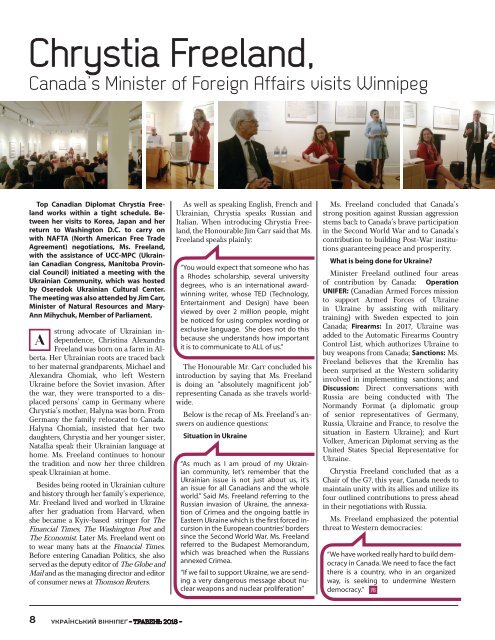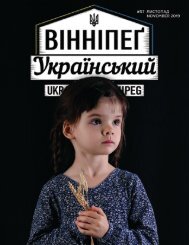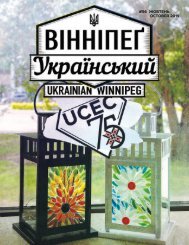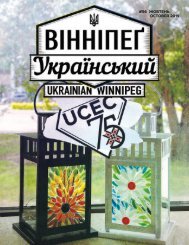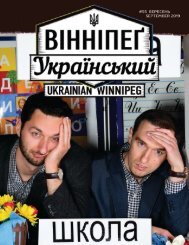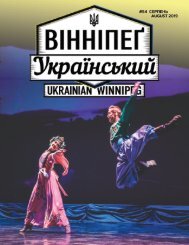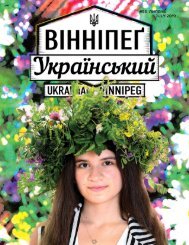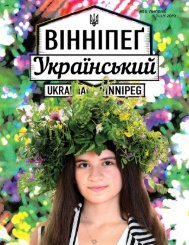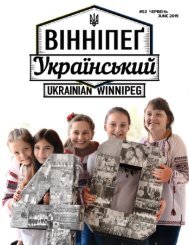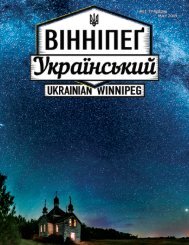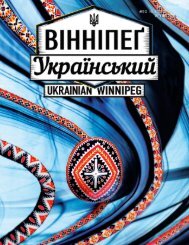Вінніпеґ Український № 15 (39) (May 2018)
Create successful ePaper yourself
Turn your PDF publications into a flip-book with our unique Google optimized e-Paper software.
Chrystia Freeland,<br />
Canada’s Minister of Foreign Affairs visits Winnipeg<br />
Top Canadian Diplomat Chrystia Freeland<br />
works within a tight schedule. Between<br />
her visits to Korea, Japan and her<br />
return to Washington D.C. to carry on<br />
with NAFTA (North American Free Trade<br />
Agreement) negotiations, Ms. Freeland,<br />
with the assistance of UCC-MPC (Ukrainian<br />
Canadian Congress, Manitoba Provincial<br />
Council) initiated a meeting with the<br />
Ukrainian Community, which was hosted<br />
by Oseredok Ukrainian Cultural Center.<br />
The meeting was also attended by Jim Carr,<br />
Minister of Natural Resources and Mary-<br />
Ann Mihychuk, Member of Parliament.<br />
strong advocate of Ukrainian independence,<br />
Christina Alexandra<br />
A<br />
Freeland was born on a farm in Alberta.<br />
Her Ukrainian roots are traced back<br />
to her maternal grandparents, Michael and<br />
Alexandra Chomiak, who left Western<br />
Ukraine before the Soviet invasion. After<br />
the war, they were transported to a displaced<br />
persons’ camp in Germany where<br />
Chrystia’s mother, Halyna was born. From<br />
Germany the family relocated to Canada.<br />
Halyna Chomiak, insisted that her two<br />
daughters, Chrystia and her younger sister,<br />
Natalka speak their Ukrainian language at<br />
home. Ms. Freeland continues to honour<br />
the tradition and now her three children<br />
speak Ukrainian at home.<br />
Besides being rooted in Ukrainian culture<br />
and history through her family’s experience,<br />
Mr. Freeland lived and worked in Ukraine<br />
after her graduation from Harvard, when<br />
she became a Kyiv-based stringer for The<br />
Financial Times, The Washington Post and<br />
The Economist. Later Ms. Freeland went on<br />
to wear many hats at the Financial Times.<br />
Before entering Canadian Politics, she also<br />
served as the deputy editor of The Globe and<br />
Mail and as the managing director and editor<br />
of consumer news at Thomson Reuters.<br />
As well as speaking English, French and<br />
Ukrainian, Chrystia speaks Russian and<br />
Italian. When introducing Chrystia Freeland,<br />
the Honourable Jim Carr said that Ms.<br />
Freeland speaks plainly:<br />
“You would expect that someone who has<br />
a Rhodes scholarship, several university<br />
degrees, who is an international awardwinning<br />
writer, whose TED (Technology,<br />
Entertainment and Design) have been<br />
viewed by over 2 million people, might<br />
be noticed for using complex wording or<br />
exclusive language. She does not do this<br />
because she understands how important<br />
it is to communicate to ALL of us.”<br />
The Honourable Mr. Carr concluded his<br />
introduction by saying that Ms. Freeland<br />
is doing an “absolutely magnificent job”<br />
representing Canada as she travels worldwide.<br />
Below is the recap of Ms. Freeland’s answers<br />
on audience questions:<br />
Situation in Ukraine<br />
“As much as I am proud of my Ukrainian<br />
community, let’s remember that the<br />
Ukrainian issue is not just about us, it’s<br />
an issue for all Canadians and the whole<br />
world.” Said Ms. Freeland referring to the<br />
Russian invasion of Ukraine, the annexation<br />
of Crimea and the ongoing battle in<br />
Eastern Ukraine which is the first forced incursion<br />
in the European countries’ borders<br />
since the Second World War. Ms. Freeland<br />
referred to the Budapest Memorandum,<br />
which was breached when the Russians<br />
annexed Crimea.<br />
“If we fail to support Ukraine, we are sending<br />
a very dangerous message about nuclear<br />
weapons and nuclear proliferation”<br />
Ms. Freeland concluded that Canada’s<br />
strong position against Russian aggression<br />
stems back to Canada’s brave participation<br />
in the Second World War and to Canada’s<br />
contribution to building Post-War institutions<br />
guaranteeing peace and prosperity.<br />
What is being done for Ukraine?<br />
Minister Freeland outlined four areas<br />
of contribution by Canada: Operation<br />
UNIFER: (Canadian Armed Forces mission<br />
to support Armed Forces of Ukraine<br />
in Ukraine by assisting with military<br />
training) with Sweden expected to join<br />
Canada; Firearms: In 2017, Ukraine was<br />
added to the Automatic Firearms Country<br />
Control List, which authorizes Ukraine to<br />
buy weapons from Canada; Sanctions: Ms.<br />
Freeland believes that the Kremlin has<br />
been surprised at the Western solidarity<br />
involved in implementing sanctions; and<br />
Discussion: Direct conversations with<br />
Russia are being conducted with The<br />
Normandy Format (a diplomatic group<br />
of senior representatives of Germany,<br />
Russia, Ukraine and France, to resolve the<br />
situation in Eastern Ukraine); and Kurt<br />
Volker, American Diplomat serving as the<br />
United States Special Representative for<br />
Ukraine.<br />
Chrystia Freeland concluded that as a<br />
Chair of the G7, this year, Canada needs to<br />
maintain unity with its allies and utilize its<br />
four outlined contributions to press ahead<br />
in their negotiations with Russia.<br />
Ms. Freeland emphasized the potential<br />
threat to Western democracies:<br />
“We have worked really hard to build democracy<br />
in Canada. We need to face the fact<br />
there is a country, who in an organized<br />
way, is seeking to undermine Western<br />
democracy.” УВ<br />
8 <strong>Український</strong> <strong>Вінніпеґ</strong> - ТРАВЕНЬ <strong>2018</strong> -


